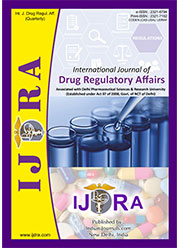A COMPREHENSION STUDY ON REGULATION OF HERBAL DRUGS IN USA, EUROPEAN UNION AND INDIA
Abstract
The present study reviews the regulations of herbal drugs in the EU, US and India and throws light upon issues
related to their clinical trials. Herbal drugs have been used for a long time in different systems of health like
Ayurveda, Yunani, Sidha and Homeopathy for treating number of diseases. It is a very difficult to perform clinical
study on herbal drugs because these drugs are a complex combination of active ingredients. It is therefore difficult to
identify the ingredient which is responsible for the therapeutic effect amongst various ingredients of herbal drugs. The
standardization of herbal drugs is also a very difficult task. In spite of all these problems are existing public interest
has increased towards herbal drugs in last 2-3 decades because of their long history of treating the disease safely. The
laws and regulations for herbal drugs are different in different countries. The WHO has stated that each country
should have a system to regulate herbal drugs in their territory. In the EU the committee on herbal medicinal products
(HMPC) which part of the EMA was established under regulation (EC) No. 726/2004 and European directive
2004/24/EC in September, 2004. The main duty of HMPC is to evaluate and give authorization for herbal drugs on
the basis of their safety and efficacy. In US herbs are classified as dietary supplements after the introduction of the
Dietary Supplement Health and Education Act (DSHEA) in1994. In US herbal drugs are categorized into two types,
first is OTC herbal drugs and drugs which required NDA approval. In India the Department of AYUSH has made
guidelines for quality enhancement of herbal substances. The present study reviews the regulations of herbal drugs in
the EU, US and India and throws light upon issues related to their clinical trials.
Downloads
References
Challenges and guidelines for clinical trial of herbal
drugs. Journal of Pharmacy & Bioallied Sciences.
2016; 7(4):329-33.
2. Eisenberg DM, Davis RB, Ettner SL, Appel S,
Wilkey S, Van Rompay M, Kessler RC. Trends in
alternative medicine use in the United States, 1990-
1997: Results of a follow-up national survey. JAMA.
1998; 280:1569-75.
3. Sharma A, Kumar R, Mishra A, Gupta R. Problems
associated with clinical trials of Ayurvedic
medicines. Revista Brasileira de Farmacognosia.
2010; 20(2):1-8.
4. Vishal P, Patel NM. Review on Quality, Safety and
Legislation for Herbal Products. International Journal
of Research in Ayurveda & Pharmacy. 2011;
2(5):1486-9.
5. Geneva. Guidelines for the assessment of herbal
medicines, program of traditional medicines. World
Health Organization: Geneva; 1991.
6. Geneva. WHO guidelines on good agricultural and
collection practices for medicinal plants. Geneva:
World Health Organization; 2003.
7. Mosihuzzaman M, Choudhary MI. Protocols on
safety, efficacy, standardization, and documentation
of herbal medicine (IUPAC technical report). Pure
Appl Chem. 2008; 80(10):2195-2230.
8. Kannan G. Herbal Medicine in Clinical Trials:
Regulation and Challenges [Internet]. MMS Blog
2013 [cited 202017 Oct]. Available from:
http://www.mmsholdings.com/mms-blog/.
9. Tilburt JC, Kaptchuk TJ. Herbal Medicine Research
and Global Health: An ethical analysis. Bulletin
World Health Organ. 2008; 86(8):594–9.
10. Directive 2004/24/EC of the European Parliament
and of the Council [Internet]. 2016 [Cited on 2016
May 28]. Available from:
http://eurlex.europa.eu/LexUriServ/LexUriServ.do?ur
i=OJ:L:2004:136:0085:0090:en:PDF
11. Directive 2001/83/EC of the European Parliament
and of the Council of 6 November 2001 on the
community code relating to medicinal products for
human use [Internet]. 2001 Nov [Cited on 2016 May
28]., Available from:
http://www.edctp.org/fileadmin/documents/ethics/DI
RECTIVE_200183EC_OF_THE_EUROPEAN_PAR
LIAMENT.pdf
12. Verma N. Herbal Medicines: Regulation and Practice
in Europe, United States and India. International
Journal of Herbal Medicine. 2013; 1(4):1-5.
13. European Medicines Agency. Guideline on the
assessment of clinical safety and efficacy in the
preparation of community herbal monographs for
well-established and of community Herbal
Monographs / Entries to the community list for
Traditional Herbal Medicinal Products / Substances /
preparations [Internet]. 2009 [Cited on 2016 May 29].
Available from:
http://www.ema.europa.eu/docs/en_GB/document_lib
rary/Scientific_guideline/2009/09/WC500003644.pdf
14. Dietary Supplements: A Framework for Evaluating
Safety. Washington, DC: National Academies Press;
2005.
15. Harkey MR, Henderson GL, Gershwin ME, Stern JS,
Hackman RM. Variability in commercial ginseng
products: an analysis of 25 preparations. Am J Clin
Nutr. 2001; 73:1101-6.
16. Bent S. Herbal Medicine in the United States: Review
of Efficacy, Safety, and Regulation. Journal of
General Internal Medicine. 2010; 25(6):854-9.
17. Wu KM, Dou J, Ghantous H, Chen S, Bigger A,
Birnkrant D. Current regulatory perspectives on
genotoxicity testing for botanical drug product
development in the USA. Regulatory Toxicology and
Pharmacology. 2010; 56(1):1-3.
18. Evans S. Changing the knowledge base in western
herbal medicine, Social Science & Medicine. 2008;
67(12):2098-2106.
19. ICMR. Ethical guidelines for biomedical research on
human participants. Director-General, Indian Council
of Medical Research, New Delhi; 2006.
20. Drugs and cosmetics (first and second amendment)
rules 2008. Ministry of Health and Family Welfare,
Govt. of India; 2008.
21. Alexander J. Qci entrusts 2 agencies as certification
bodies for units making ayush products. Pharmabiz;
2010.
The International Journal of Drug Regulatory affairs require a formal written transfer of copyright from the author(s) for each article published. We therefore ask you to complete and return this form, retaining a copy for your records. Your cooperation is essential and appreciated. Any delay will result in a delay in publication.
I/we have read and agree with the terms and conditions stated Page 2 of this agreement and I/we hereby confirm the transfer of all copyrights in and relating to the above-named manuscript, in all forms and media, now or hereafter known, to the International Journal of Drug Regulatory affairs, effective from the date stated below. I/we acknowledge that the IJDRA is relying on this agreement in publishing the above-named manuscript. However, this agreement will be null and void if the manuscript is not published in the IJDRA.
Download link for COPYRIGHT FORM







